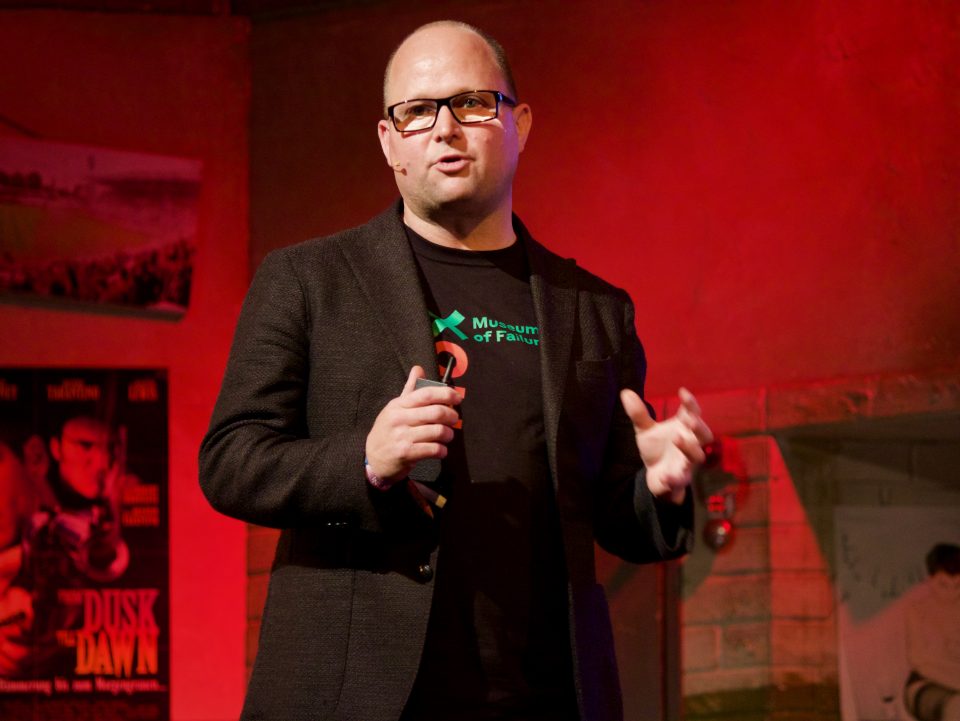keynotes
& workshops
Samuel West - keynote speaker
In the past ten years I have given over 160 keynote speeches in 34 countries across the globe. And countless smaller talks. During the pandemic all that turned into virtual keynotes and virtual museum tours. Each speaking engagement is tailored to the audience to keep things relevant and really interesting.
Key topics: failure, innovation, exploration and experimentation, playfull approach to work.
Keywords: insightful, engaging, humor, instructional, educational, energetic

Most popular keynote:
Lessons from The Museum of Failure

Relevant stories from the Museum of Failure's collection are used as a backdrop to explore the role of failure in innovation. The audience will gain fascinating insights into the risky business of innovation and the benefits of productive discussions about failure. The most interesting and relevant items from the museum are used to communicate the main points.
Alternative titles: Learning from Failure, Why we must fail, The Art of Failing.
Main points:
• Importance of accepting and learning from failure.
• Why are we so afraid of failing?
• Encouraging meaningful risk taking.
• Difference between good vs bad failure.
• Mastering experimentation.
• The what and how of Psychological Safety
• Cultural differences in approaches to failure.
Alternative titles: Learning from Failure, Why we must fail, The Art of Failing.
Main points:
• Importance of accepting and learning from failure.
• Why are we so afraid of failing?
• Encouraging meaningful risk taking.
• Difference between good vs bad failure.
• Mastering experimentation.
• The what and how of Psychological Safety
• Cultural differences in approaches to failure.
Memorable talks
• A super-engaged audience of over 3000 in Bangalore, India.
• Midnight TEDx talk in Abidjan, Ivory Coast.
• A large empty auditorium in Copenhagen beginning of Covid.
• A sweaty talk at WeWork’s office in Shanghai.
Popup mini-exhibition

If you are planning a larger event you might also be interested in the popup mini-exhibit.
More info and photos.
Prices and availabilty.
workshops
Mini-workshop:
Psychological Safety
This is the hottest concept in organizational psychology. Google’s massive study of 180 teams found that the key to high-performing innovative teams is psychological safety. It’s the feeling within a team that it is safe to take an interpersonal risk such as being seen as ignorant, incompetent, negative, or disruptive. It is a sense of confidence that no one on the team will embarrass or punish anyone else for admitting a mistake, asking a question, or offering a new idea.
Time: 1-2 hours
Optimal group size: 6-12
Available virtually: yes
Mini-workshop:
Boost innovation by increasing your failure rate.
This workshop introduces the experimental approach to innovation. Your team will learn about the power of a clever experiment, which remains grossly underused by companies across industries. It is not only scientists and internet marketers that benefit from experimentation. We use the cases your team is currently working on to learn how to design experiments, conduct experiments, and learn from the results. Scientific progress is all about learning from failed experiments.
Time: 2-3 hours
Optimal group size: 4-12
Available virtually: yes
Mini-workshop:
Learning from failure.
There is an old saying that ‘it is wise to learn from your own failure, but even wiser to learn from the failures of others’. In this workshop we use in-depth cases from the most relevant items at the Museum of Failure to become more comfortable with productive discussions about failure. This workshop is suitable for teams that have had at least an introduction to psychological safety.
Time: 1-3 hours
Optimal group size: 4-12
Available virtually: yes
Prices and availabilty.